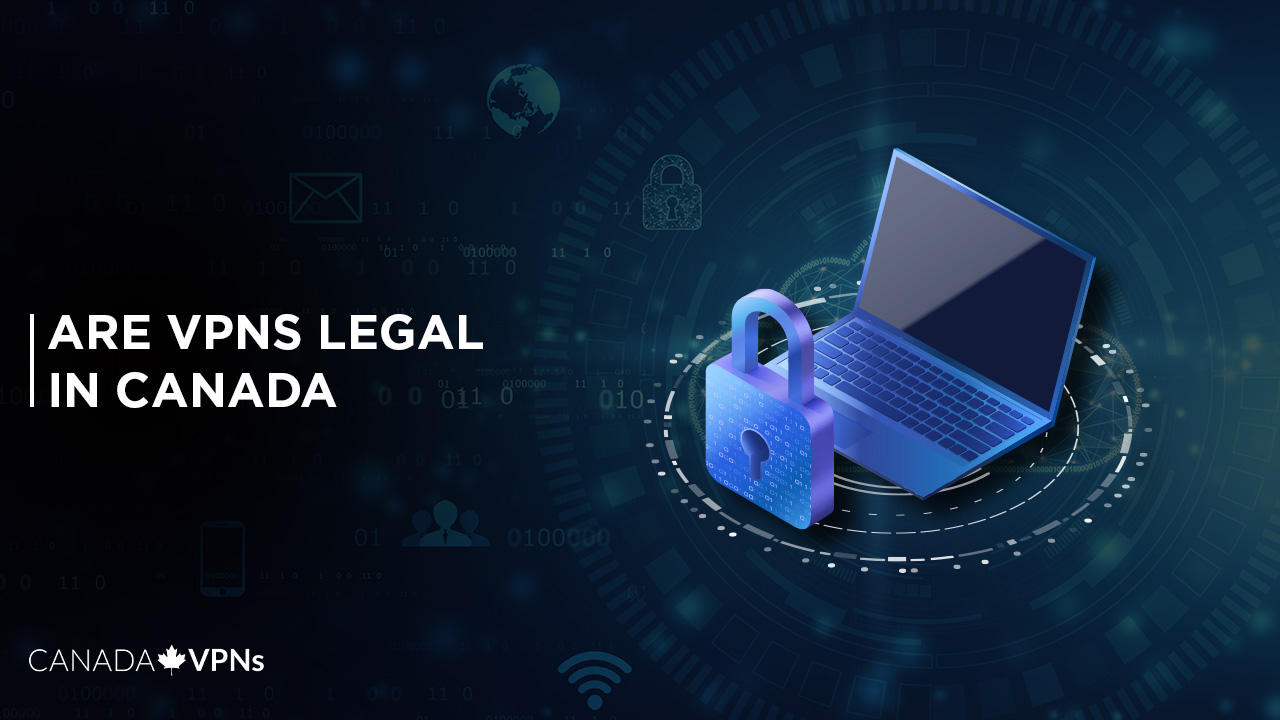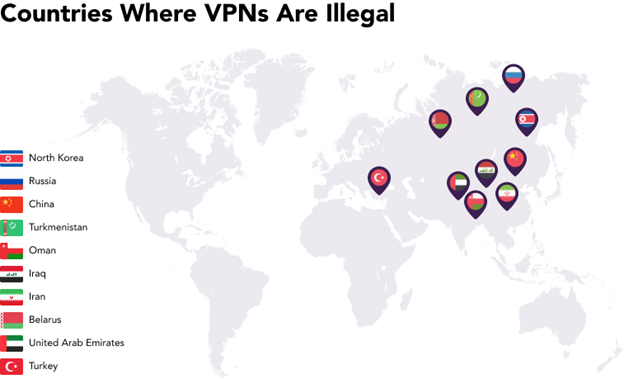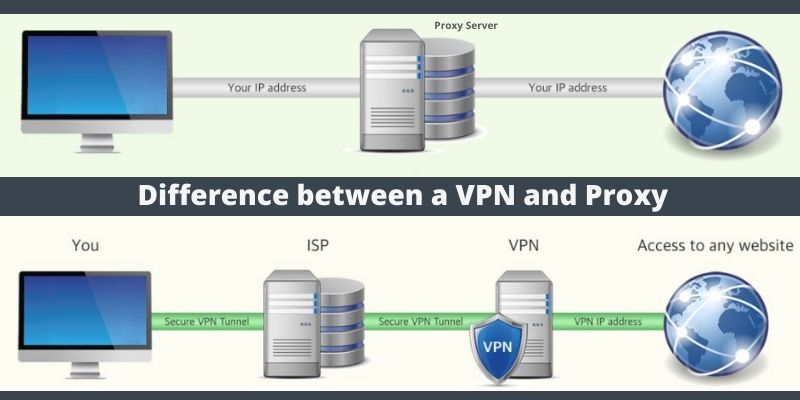Before diving into the conundrum of which VPN we should purchase, let’s first discuss the question that bothers you whenever you hear the term “VPN”; “Are VPNs legal in Canada?”
While the term VPN may conjure images of cyber-attacks and illegal and suspicious activities on the dark web, VPNs are actually pretty useful for online security and safety.
And yes, it’s completely legal in many countries, including Canada! Some Canadian VPN services conceal your IP address, encrypt your connection on the internet, and stop others, such as government online watchdogs or internet service providers (ISPs), from keeping tabs on your online whereabouts.
There are hundreds of reasons to use this tool, but you should consider what is legal and illegal while using a VPN! It is imperative for VPN users to be aware of their country’s policies and should be able to distinguish between legal and illegal activities through VPN.
Before we dig deeper into the legality of VPNs in Canada, it’s crucial to understand that while using VPNs might be legal, indulging in illegal activity with them is strictly impermissible. You’ll be accountable under your country’s policies if you’re involved in illegal activities online and using a VPN for this purpose.
A VPN can help hide your identity, but selling drugs, hacking into other systems, and stealing copyright material is illegal and can jeopardize you.
Where are VPNs illegal?
Every country holds a different perception of VPNs; some consider them legal, while others do not! Therefore, the legality of VPNs may vary from country to country. Currently, a handful of countries either regulate the use of VPNs or prohibit them. These countries include China, Russia, North Korea, Iraq, and Iran, to name a few.
Depending on the country’s laws and regulations, governments may impose hefty fines on both the user and the VPN service provider for using an unauthorized VPN. Usually, many governments impose this restriction as an attempt to prevent terrorist cyber-attack or other criminal activities.
Are VPNs legal in Canada?
Yes, the government of Canada permits the use of VPN for security and safety purposes, including streaming TV Canada with legal means. It’s entirely legal, but should you use a VPN in Canada for illegal activities online such as hacking, identity theft, selling drugs, and other cybercrimes?
Browsing the internet anonymously is fun, paying hefty fines or going to jail; however, not that much! – Although both the activities involve plenty of sitting!
That said, if someone relies on VPNs to hack into anyone’s computer or pirate movies and sell them for profit, they will be prosecuted under the country’s cybercrime laws. It doesn’t matter if they use VPN; all that matters is they use it to do something illegal.
However, suppose you want to strengthen your online security, hide your internet whereabouts from snoops, stream geo-restricted content, or prevent your ISP from tailing you around the internet and suppressing your bandwidth while using a VPN. In that case, it’s completely legal and doesn’t violate any Canadian VPN laws.
Can VPN be used for illegal activity?
If you have any concerns, like is a VPN illegal in Canada? Relax! The government of Canada has legalized VPNs but with certain limitations. Using a VPN to commit illegal activity prohibited under Canadian laws, like hacking and drug selling, does not make them legal!
It’s just that the government will have a tough time tracking you down. Even when you use VPN, law enforcement agencies can still track you down and put you behind bars if found committing illegal activities. After all, the more heinous the crime, the more likely you will be tracked and brought down to justice!
In fact, some Canadian Internet laws even allow authorities to ask VPNs for users’ data, which is why it’s recommended to use only a VPN with no logs policy. A VPN with a no-logs policy does not record or store the data that could trail back to you. So even if the provider is forced to turn over your data, they won’t have anything in their registry.
That said, it’s important to note that using VPNs goes against the policies of some streaming platforms, such as Hulu, and Netflix. The streaming giant does not allow users to access regionally restricted content, hence, opposes VPN use.
However, Netflix could never report any of their subscribers to authorities just for accessing restricted content through including American Netflix in Canada is geo-blocked. But they can cancel your subscription! – Yeah, the streamer has its way of giving punishments.
But… It happens rarely! After all, they want to keep their customers, right? So the worst they can do is to prevent you from streaming their titles until you have disconnected from the VPN. So far as Canada’s streaming laws are concerned, you’re safe!
What are the legitimate uses of VPN?
While some, unfortunately, do use VPNs for illegal purposes, many legitimate uses of a VPN make it incredibly useful for web browsing. Here are some of the most common and widely popular uses of a VPN:
- Businesses and government agencies use VPNs for secure communication and operations. They primarily use VPNs to protect their privileged information and data from potential breaches and hacking.
- Concerned people who don’t like to be tracked by the government or other organizations use VPNs to remain anonymous. But can you be tracked with a VPN? While most VPN services might not be as effective in avoiding the tracking mechanism of government organizations, a premium VPN like ExpressVPN would be great for this purpose.
- VPN is also used to protect your device and data from malicious sites and viruses while using a public network.
- You can also use VPN to stream region-restricted content on streaming sites such as YouTube TV, ESPN Plus and HBO Max in Canada.
Why would users in Canada need a VPN?
A Virtual Private Network (VPN) is an effective tool to protect our online identity from potential data breaches by allowing us to create a secure, independent, and fast connection to another network over the internet.
Bypassing geo-restrictions on Streaming Networks
A VPN shields your web browsing activities against hackers on public networks. In addition to this, it is widely used to access the geo-restricted content on streaming sites such as Sling TV, Peacock TV channel, and many more.
Wondering how do I get around regional streaming restrictions with a VPN. A VPN is a tool that acts as a “cloak of invisibility” (yes, the one that Harry Potter uses) that renders the wearer invisible. It changes your IP address and makes you invisible to the eyes of IPS, who are prying on your every virtual move.
For Business use
About 400 million individuals and businesses have used virtual private networking (VPN) services for privacy and security. In particular, VPNs designed for commercial use safeguard the information exchange between employees and guard their network connections from unauthorized intrusion.
Businesses usually use VPNs to access internal applications and data to employees working remotely or establish a shared network between offices in different regions. The ultimate aim is to prevent privileged data from being compromised on the open internet in both situations.
The same practice follows in Canada as well! About 14% to 20% of the Canadian population uses VPN for business purposes – a level on par with the United States. But you know what? According to Freedom House, Canada is characterized as the third highest-scorer country regarding internet accessibility, with a whopping Freedom Internet Score of 87.
And because of the accessible nature of Canada’s Internet, it reduces the likelihood of VPN usage. Unlike more restrictive countries that control internet accessibility and censorship, Canadians can access anything they please online.
Anonymity from the prying eyes of the Government
But regardless of all the internet freedom, Canada is a member of the Five Eyes intelligence alliance. But wait, what is that? Well, a group of five countries – the USA, UK, Australia, New Zealand, and of course, Canada – have agreed to explicitly exchange information and data they gather from spying on their own citizens.
And even if you’re not involved in any suspicious activity, you wouldn’t like to be traced everywhere and every time, right? This is why many Canadians don’t trust their government’s secretive tactics to spy on them. Hence, they prefer using a VPN for safe and secure internet browsing.
Online Data security on Public Networks
The motivation for using VPNs may vary from one country to another. However, in Canada, the foremost goal for many VPN users is to have a secure browsing experience by hiding their identity, particularly for business security and geo-restricted content streaming especially using Public Wifi or network to eliminate the risk of hackers or malware.
How to choose the right VPN for Canada?
Given the sheer number of VPN service options, it’s difficult to choose the right one that fits best for your purpose. Say no more! There’s no need to stress yourself when we have done all the legwork for you. Scroll down and discover the list of the 3 best VPN services in Canada:
1- ExpressVPN: The Fastest VPN provider, with over 3,000 servers spread across 94 countries. Its lightning-fast speed lets you stream content without interruption at just CA$ 9.12/mo (US$ 6.67/mo).
2- Surfshark: Most Affordable VPN and an excellent choice for all those seeking to protect and advance their virtual rights at just CA$ 3.4/mo (US$ 2.49/mo). With its no-logging policy, you can venture everywhere online while maintaining true anonymity.
3- NordVPN: Largest Server Network VPN provider in the industry, NordVPN offers an impressively fast browsing experience with over 5,500 servers globally at just CA$ 5.46/mo (US$ 3.99/mo).
How to bypass geo-blocked content using a VPN?
Unable to stream your favorite content due to geo-restriction? Here’s how you can bypass region-blocked content:
- Install a reliable Canadian VPN like ExpressVPN on your device
- Once installed, open your VPN and sign in using your credentials.
- Your VPN will automatically connect you to the nearest server available from your location. You can always change the server of your choice for streaming region-specific content.
What does Canadian Law say?
Being a zealous advocate of innovation, Canada is quite clear on its policies regarding the use of VPNs. They are just as legal as freedom of expression. It means there is no single law that prohibits the use of VPNs in the country. However, just because you don’t have any shackles around your neck (in this case, fingers) doesn’t mean you can roam around freely! There are certain boundaries that you need to be considerate about.
For example, a person who’s found pirating movies and stealing content using VPN would be held accountable under the country’s copyright laws. So, it doesn’t matter if you use VPN; what matters is that you use it for a legitimate purpose and not anything that could land you into trouble or even jail; who knows!
What is the difference between VPN and a proxy server?
Despite several overlapping features, VPN and proxy servers are still considered two separate tools with different functionalities. A proxy server acts as a gateway to restricted content. Whereas a VPN connection encrypts and secures all of your network traffic end-to-end.
The proxy server doesn’t maintain entire anonymity. As all of the internet traffic that passes through a proxy can be seen by the server owner. In contrast, a VPN connection can conceal and route all of your web activities. Thus, maintaining the complete anonymity of the user.
What is the best Free or Paid VPN service in Canada?
It’s easy to get overwhelmed by the great number of Canadian VPN providers present in the market. Most of them are free to use. However, we don’t recommend going with free VPNs as they are unsafe and can put you in trouble by leaking your data.
Therefore, to help you choose the right yet affordable VPN, we’ve compiled a detailed guide on Cheap VPNs for Canada 2022 – Get them all right here. The VPNs recommended in the guide give you the utmost security and privacy in pocket-friendly subscription plans.
And if you’re still short on cash but want to protect your devices from all kinds of surveillance and unblock popular streaming services in Canada? You can do this using a free VPN for Canada.
FAQs
Here are quick answers to your most common queries;
Can I connect to a Canadian server for accessing Canada-specific content?
Can I get exposed when using a VPN?
Is it legal to use a VPN service to access a website that is banned in Canada?
Is torrenting illegal in Canada?
Is watching movies online illegal in Canada?
What is illegal to watch on the internet in Canada?
Is downloading copyrighted material illegal in Canada?
Final Words
Based on the arguments above, the answer to your ultimate question, “Are VPNs legal in Canada?” is: Yes! The Government of Canada doesn’t legally restrict you from using a VPN if you’re using it for legitimate reasons.
For safety, we highly recommend a premium VPN like ExpressVPN for Canada. This VPN has a proven security record. Besides, it can easily unblock all major streaming services, from Netflix to BBC iPlayer in Canada. And if you’re trying to access Canadian channels outside of Canada, ExpressVPN makes it easy.
I hope this blog has answered all your concerns.
Happy browsing!


